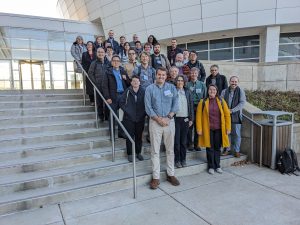Supported by the Department of Energy’s Office of Science, the AmeriFlux Management Project hosted a workshop at Argonne National Laboratory in Chicago, IL during November 13-14, 2023. The workshop, with a theme of “Land-Atmosphere Exchanges in Complex Urban Landscapes: From Process Diagnosis to Climate Impacts”, brought together more than 25 researchers from the U.S., Mexico, Europe, and Asia to discuss the challenges and potential solutions with respect to the applications of eddy covariance method in urban landscapes.

Attendees of the “Land-Atmosphere Exchanges in Complex Urban
Landscapes: From Process Diagnosis to Climate Impacts” workshop
Led by a scientific committee consisting of Ken Davis (The Pennsylvania State University), Jiquan Chen (Michigan State University) and Enrique Vivoni (Arizona State University), the workshop identified knowledge gaps and research needs concerning exchanges of trace gasses and energy between the surface and the atmosphere in complex urban landscapes. This is a timely topic for urban science in the United States, partially inspired by the recent investment of the Department of Energy in Urban Integrated Field Laboratories in Chicago, Baltimore, Phoenix, and Beaumont-Port Arthur.
Participants interacted in four thematic sessions over the two-day workshop. In the first theme, led by Xuhui Lee (Yale University) and Ken Davis, the challenges in conducting eddy covariance measurements in urban areas were discussed, including issues related to deployment strategies, sensor platforms, data processing and source decomposition. In the second theme, presented and facilitated by Sue Grimmond (University of Reading) and Jiquan Chen, the site descriptors and ancillary data for heterogeneous urban area were summarized, including the need for standardized approaches that enable intra- and inter-city comparisons. In the third theme, led by Daniel Ricciuto (Oak Ridge National Laboratory) and Enrique Vivoni, a range of urban models were presented and placed in the context of how models can be parameterized and improved using the datasets from eddy covariance towers. In the final theme, Elie Bou-Zeid (Princeton University) and Sebastien Biraud (Lawrence Berkeley National Laboratory) discussed how eddy covariance studies can aid in impact, adaptation, and mitigation studies in urban systems.
The breadth and depth of experiences among the participants led to a set of lively and forward-looking discussions concerning these themes and the role of eddy covariance measurements in support of holistic studies in urban science. Prior applications of eddy covariance method across multiple cities were presented, including in Indianapolis, London, Chicago, Phoenix, Mexico City, and Singapore, which helped to disseminate information and broaden participation from a wider research community. Graduate students and early career researchers participated in the workshop. Furthermore, a variety of expertise was represented and participants shared perspectives on this interdisciplinary topic from disciplines such as boundary layer meteorology, ecosystem ecology, hydrology, environmental fluid mechanics, air quality, remote sensing and Earth systems modeling.
As a special highlight, the participants were able to tour the instrumentation facilities at the Argonne Testbed for Multiscale Observational Science and discuss their deployment across the greater Chicago landscapes as part of the Community Research on Climate & Urban Science DOE Urban Integrated Field Laboratory.
Led by the scientific committee, an official workshop report to the DOE’s Environmental System Science Program will be developed by the participants. Opportunities for broader engagement are envisioned through the establishment of a working group within AmeriFlux, a first step toward an urban flux network. Other scientists interested in this topic are encouraged to contact Dr. Sebastien C. Biraud (scbiraud@lbl.gov) who serves as the principal investigator of this initiative.

No Comments
Be the first to start a conversation